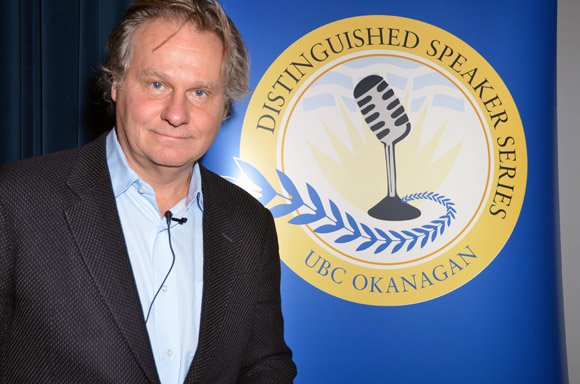
Wade Davis
Explorer Wade Davis shares his experiences at Distinguished Speaker Series event
Wade Davis – ethnographer, writer, photographer, and filmmaker – shared his vivid photography and captivating stories of global exploration with a capacity crowd Wednesday night, challenging the audience to contemplate the question of what it truly means to be human and to be alive.
His presentation at the Kelowna Community Theatre was the first in this season’s UBC Distinguished Speaker Series.
“When the 7,000 cultures of the world respond to the question of what it means to be human and alive, they do so in 7,000 different voices and those answers collectively become our human repertoire in dealing with the challenges that confront us as a species for the ensuing centuries,” said B.C.-born Davis.
Davis notes that rediscovering a new appreciation for the diversity of the human spirit as expressed by culture, is among the central challenges of our times.
“Together the myriad cultures of the world make up an intellectual, social, and spiritual web of life that envelopes the planet and is important to the well-being of the planet, as is the biological web of life that you know so well as the biosphere,” said Davis.
“You can think of this cultural web of life as being an ‘ethnosphere’ – the sum total of all thoughts and dreams, ideas and intuitions, myths and possibilities, since the dawn of consciousness. The ethnosphere is humanity’s great legacy. It is a symbol of all we have achieved and the promise of all we can achieve as a wildly creative and innovative species.
“Just as the biological web of life has been severely impacted by the loss of habitat and the loss of plants and animal life, so too has the ethno sphere, but at a far greater rate.”
Language loss is a great indicator of this.
“Of the 7,000 languages spoken the day you were born, more than half are not being taught to children, meaning they’re on the road to extinction. Imagine no means or ability to pass on the wisdom of your ancestors or anticipate the promise of your descendants. On average, every two weeks, some elder in some culture passes away and carries with him or her into the grave the last syllables of the ancient tongue.”
Davis concluded his talk stressing that culture is far beyond the songs a person sings, the clothes they wear, and the god they pray to. It is vital to Earth’s health, species survival, and the progression of the collective human journey.
“If there is one thing that anthropology teaches — and this is the central lesson of this presentation — it’s that culture is not trivial; it is not decorative. It is the body of moral and ethical values that every society places around each individual to keep at bay the barbaric heart history teaches us that, sadly, lie within every human being.”
Davis is a well-published scholar and Explorer-in-Residence at the National Geographic Society. Named by the society as one of the Explorers for the Millennium, he has been described as “a rare combination of scientist, scholar, poet, and passionate defender of all of life’s diversity.”
— 30 —